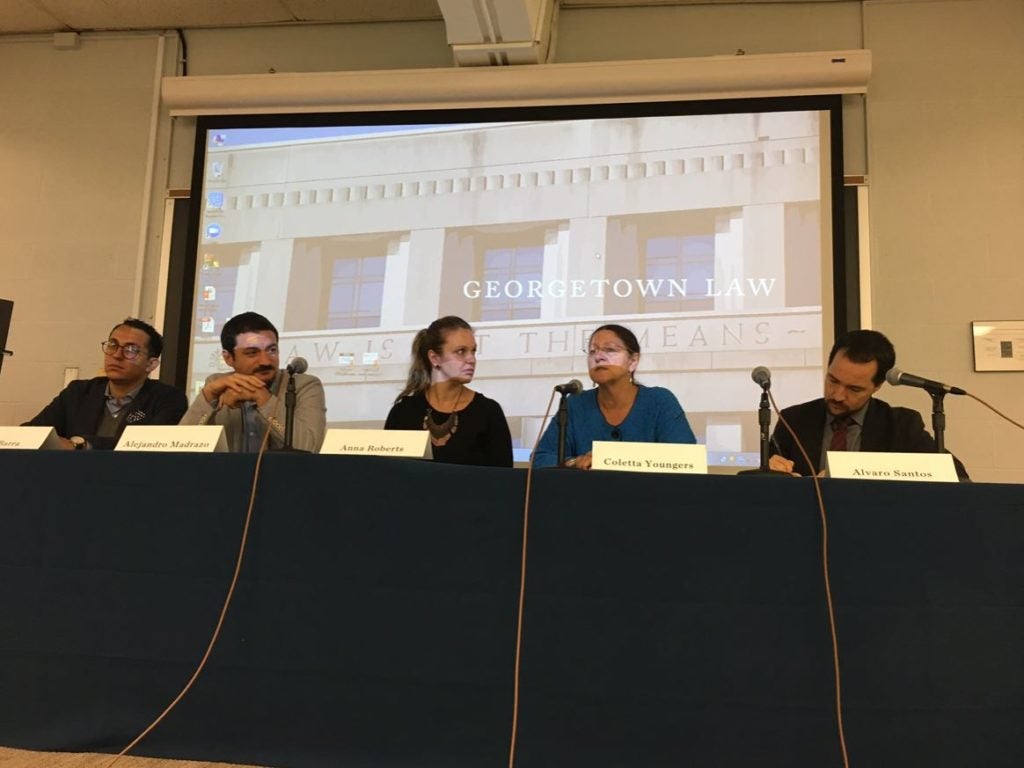What To Do After Prohibition?: Regulatory Alternatives in the Americas and the Marijuana Debate in Mexico
On September 23, 2016, CAROLA and the O’Neill Institute for National and Global Health Law hosted a one-day symposium that convened experts from different countries in the Americas discussing the regulatory, public health, social justice, and security issues that marijuana prohibition and reform face. The event aimed at providing a general overview of the effects that prohibitionist policies have had on drug consumption, incarceration, and violence in the United States and in Latin America. It also served as a forum for exploring the regulatory alternatives in the Americas for marijuana (both for medical and personal use), and analyzing the reform proposals currently being debated in Mexico as well as the Mexican government’s official position.

Symposium Program
9:00am – 11:00am
Effects of Prohibitionist Policies on Drug Consumption, Incarceration and Violence
Alejandro Madrazo Lajous, CIDE
Coletta Youngers, WOLA
Alvaro Santos, CAROLA, Georgetown Law
Aram Barra, OSF
Moderator: Anna Roberts, O’Neill Institute, Georgetown Law
The purpose of this session was to examine both the direct and the indirect consequences of prohibitionist policies. Has the use and availability of drugs increased or decreased? How effective have current prohibitionist policies been in the different countries in the region? What have been the direct and indirect consequences of these policies? What are the human rights, security, and incarceration impacts of these policies? What can we learn from the US experience? What does the scientific and empirical evidence tell us about prohibitionist policies in the last decades? Have current policies met the goals they were created for?
11:00am – 11:15am
Coffee Break
11:15am-1:15pm
Regulatory Alternatives in the Americas for Marijuana for Medical & Personal Use
Fernanda Alonso, O’Neill Institute, Georgetown Law
Eric Lindblom, O’Neill Institute, Georgetown Law
Donald McPherson, Canada Drug Policy Coalition
Geoff Ramsey, WOLA (Uruguay)
Moderator: Coletta Youngers, WOLA
The purpose of this session was to explore the current regulatory alternatives for medical and personal use of marijuana in the Americas. The current regulatory landscape in the U.S. was discussed, as well as models from other countries in the region, including Uruguay, Canada, and Colombia. Questions addressed included: What alternatives to prohibition currently exist? What can we learn from the existing models? Are there any emerging best practices? What is the best public health approach to regulation? How can different models adapt to each country and community?
1:15pm – 2:30pm
Lunch Break
2:30pm – 4:30pm
Reform Proposals and Debate in Mexico
Luis Alfonso de Alba, Mexican Ambassador to the OAS, Washington DC
Cristina Diaz, Senator (PRI), Mexico
Laura Rojas Hernández, Senator (PAN), Mexico
Fernando Belaunzarán, former Congressman (PRD), Mexico
Moderator: Alvaro Santos, CAROLA, Georgetown Law
The first two panels explored the consequences of prohibitionist policies as well as the emerging regulatory alternatives in the Americas. This last panel brought together these ideas and placed them in the current Mexican context. The purpose of this session was to explore law reform proposals introduced in the Mexican Congress and the government’s own bill. Questions examined included: What goals do medical marijuana reform proposals pursue? What goals do recreational marijuana reform pursue? What are the objectives of a deeper, integral reform? What changes are expected with either or both reforms? What will happen if both the U.S. and Canada continue legalizing and Mexico does not? What are the risks, costs and benefits of not reforming? And what are those of reforming?
